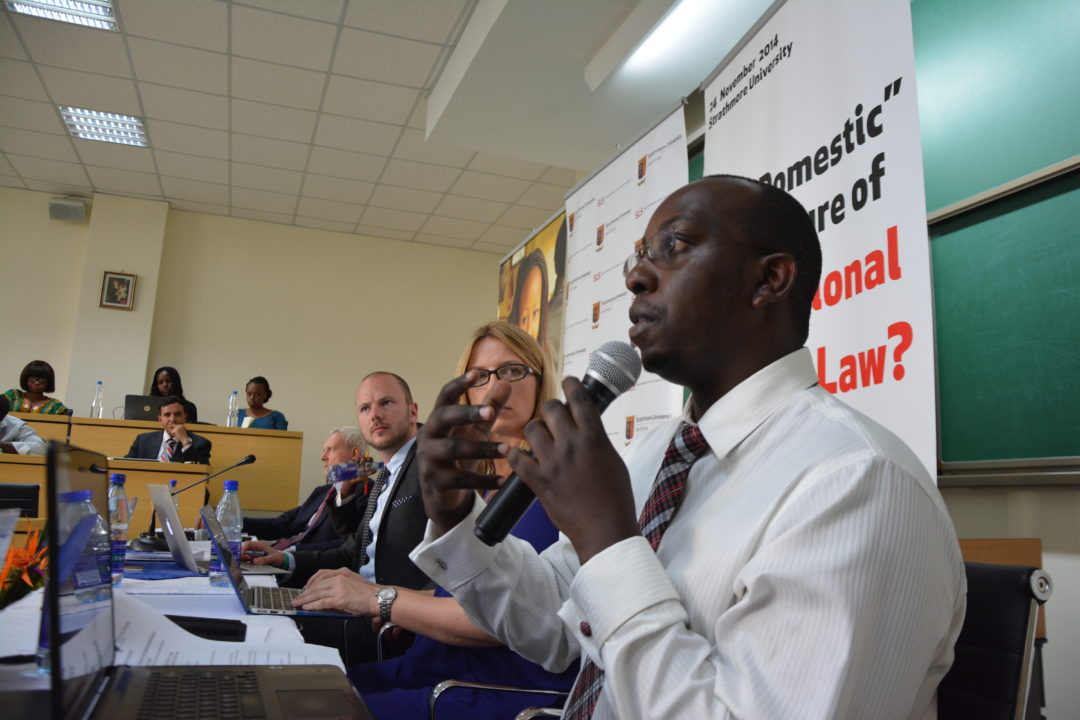On 24 November 2014, the Wayamo Foundation hosted a panel discussion on the struggle for justice and security in Kenya at Strathmore University in Nairobi.
The debate, moderated by Dr. Mark Kersten from the London School of Economics and Political Science featured both Kenyan and international panellists including:
• David Re, Trial Chamber President of the Special Tribunal for Lebanon and former international judge of the War Crimes Chamber of the Court of Bosnia and Herzegovina, Sarajevo
• Kirsten Ainley, Assistant Professor of International Relations and Director of the Centre for International Studies, London School of Economics
• Christopher Gitari, International Center for Transitional Justice (ICTJ), Nairobi
• Eric Kibet, Lecturer, Riara Law School, Nairobi
The panel discussion was open to the general public and moderator Mark Kersten invited the audience to ask questions and make comments throughout the debate.
BACKGROUND
A Complementarity Turn?
There is little debate about the fact that justice is best served locally. This is where the evidence has to be gathered, where witnesses must be contacted and, most importantly, where the affected communities live. Yet there is also a widespread recognition that not all crimes and violations of human rights can be prosecuted domestically. This is particularly so in cases where the State is unable or unwilling to pursue justice and accountability, or where the alleged crimes are committed by the State against its own citizens. The International Criminal Court (ICC) was built on the premise of complementarity. The Court can only investigate and prosecute crimes where a State has decided that it will not, or cannot, prosecute the crimes itself. According to the ICC, the ultimate success of the Court would be represented by an empty dock, due to the fact that domestic courts had themselves meted out justice for international crimes.
Dual jurisdiction: international core crimes and transnational crimes
Several International Crimes Divisions have been established in the recent past with a focus not only on the core international crimes (war crime, genocide and crimes against humanity) but also on prosecuting transnational and organised crimes. As the world becomes increasingly globalised and as state borders become more porous, we have witnessed an upsurge in crimes and criminals that cross national borders. Crimes such as terrorism, money laundering, piracy, cyber crime, organised crime, human and drug trafficking, or wildlife crimes assume such proportions that they are crimes of international concern.
The future of international justice faces many questions.
For example, how has complementarity worked in practice? Have we seen a ‘complementarity turn’, whereby the ICC is increasingly focused on directly encouraging domestic prosecutions? Has the ICC galvanised domestic institutions into genuinely prosecuting accountability for war crimes, crimes against humanity and genocide?
What lessons can be learnt from other tribunals? How should the creation of international crimes divisions in Rwanda and Uganda be viewed? What are the experiences of the War Crimes Chamber of the Court of Bosnia and Herzegovina? Where does Kenya stand with the establishment of the “International and Organised Crimes Division” (IOCD) in the High Court of Kenya? Why should these new divisions have dual jurisdiction over international core crimes and transnational organised crimes?
It has become increasingly clear that there is an overlap between transnational crimes and core international crimes. What do investigations and prosecutions of international and transnational crimes have in common? What do these new courts need in order to be successful and effective? Are international or domestic institutions better placed to deter crimes, achieve justice and accountability, and serve the interests of victims and affected communities?
Photos by Kris Kotarski, Wayamo.


